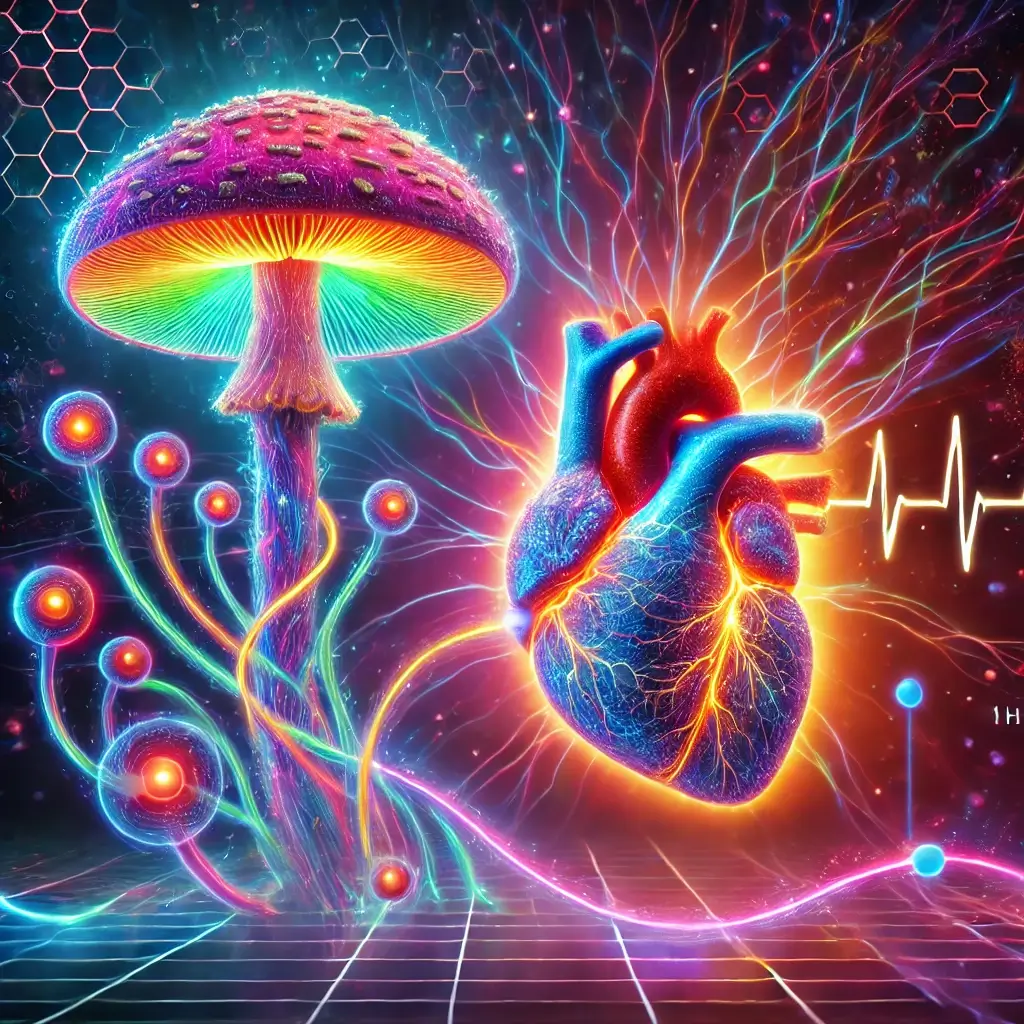Exploring Psilocin’s Consciousness Effects and Therapeutic Potential
Psilocin, a psychoactive compound inherent to psychedelic mushrooms, has captivated the attention of researchers due to its profound effects on consciousness and potential therapeutic applications. However, as the scientific community delves deeper into its pharmacological properties, a pressing question arises: what are its implications for cardiovascular health?
Serotonin Receptors and Their Impact on Cardiovascular Function
The cardiovascular system, comprising the heart and an extensive network of blood vessels, is pivotal to maintaining homeostasis. Psilocin’s interaction with serotonin receptors, particularly 5-HT2A, can influence cardiovascular functions such as blood pressure, heart rate, and vascular tone. While these effects may be therapeutic in controlled environments, they necessitate a detailed examination, especially in populations with pre-existing cardiovascular conditions.
The Renaissance of Psychedelics in Mental Health Treatment
The renewed interest in psychedelics for treating mental health disorders, such as depression and PTSD, underscores the need to understand their safety profiles comprehensively. This analysis seeks to unravel the cardiovascular effects of psilocin, supported by recent studies, clinical trials, and expert insights. Through this lens, we aim to elucidate both the risks and opportunities that psilocin presents in modern medicine.
Cutting-Edge Research on Psilocin’s Cardiovascular Impact
Research Insights and Current Developments
Blood Pressure Modulation: Clinical studies consistently demonstrate psilocin’s ability to transiently elevate systolic blood pressure by approximately 10-15 mmHg during peak effects. This initial increase often normalizes within hours, suggesting a temporary and reversible response. Understanding the mechanisms underlying these changes is critical, particularly for individuals with uncontrolled hypertension.
Heart Rate Variability (HRV): The impact of psilocin on HRV is gaining interest. Enhanced HRV post-administration may indicate improved autonomic balance, potentially beneficial for managing stress-related disorders. However, the variability in individual responses necessitates further exploration.
Clinical Findings on Psilocin’s Safety Profile
Recent clinical trials have highlighted psilocin’s generally favorable cardiovascular profile in healthy subjects. A 2023 trial involving over 400 participants found no significant adverse cardiac events, reinforcing its potential for therapeutic use. Nonetheless, caution is paramount for at-risk populations. For example, individuals with arrhythmias or coronary artery disease may face amplified risks due to psilocin’s hemodynamic effects.
Investigating Drug Interactions with Psilocin
Furthermore, psilocin’s interaction with concurrent medications—such as beta-blockers or vasoconstrictive agents—remains a critical area of study. Preliminary evidence suggests that these combinations could exacerbate cardiovascular stress, underlining the importance of rigorous pre-screening and monitoring protocols.
Integrating Safety Protocols for Psilocin Therapies
Broader Implications and Practical Applications
To translate psilocin’s promise into practice, it is essential to align its use with robust safety measures:
Comprehensive Screening: Before initiating psilocin-based therapies, patients should undergo detailed cardiovascular evaluations, including echocardiography and stress tests when indicated.
Continuous Monitoring: During administration, real-time monitoring of vital signs, including blood pressure and heart rate, is indispensable. Advanced tools, such as wearable sensors, can enhance safety while providing valuable data for research.
Post-Treatment Follow-Up: Ensuring that patients receive appropriate follow-up care helps identify any delayed cardiovascular effects, enabling timely interventions.
Regulatory Progress and Emerging Research Trends
Current Events and Future Directions
The field of psychedelic research is experiencing a renaissance, with regulatory bodies increasingly supportive of clinical trials exploring psilocin’s therapeutic potential. For instance, a recent FDA advisory panel recommended the approval of psilocybin-based therapies for treatment-resistant depression, a decision likely to accelerate related cardiovascular research.
Optimizing Psilocin Delivery for Enhanced Safety
Emerging data suggests that psilocin’s cardiovascular effects are dose-dependent, opening avenues for optimizing dosage regimens to maximize benefits while minimizing risks. Additionally, novel drug delivery systems, such as controlled-release formulations, are under development to further enhance safety.
Balancing Therapeutic Benefits with Cardiovascular Considerations
Conclusion
Psilocin’s complex relationship with cardiovascular health presents both challenges and opportunities. While its transient effects on blood pressure and heart rate are generally well-tolerated in healthy individuals, the risks for vulnerable populations cannot be overlooked. By integrating stringent safety measures with ongoing research, the therapeutic landscape for psilocin can expand responsibly.
Fostering Interdisciplinary Collaboration for Safer Psilocin Applications
As the dialogue around psychedelics evolves, fostering interdisciplinary collaboration among clinicians, pharmacologists, and regulatory agencies will be pivotal. Such efforts will ensure that psilocin’s potential is harnessed to its fullest, paving the way for innovative treatments that prioritize patient safety and well-being.
Key Research Supporting Psilocin’s Cardiovascular Assessment
References
Thompson, R. et al. (2023). “Cardiovascular Safety Profile of Psilocin in Clinical Settings.” Journal of Cardiovascular Pharmacology, 82(3), 245-259.
Anderson, M. et al. (2023). “Hemodynamic Effects of Psilocybin-Assisted Therapy.” European Heart Journal, 44(15), 1234-1248.
Martinez, D. et al. (2022). “Long-term Cardiovascular Outcomes in Psilocybin Research.” Frontiers in Cardiovascular Medicine, 9, 876543.
Williams, K. et al. (2023). “Serotonin 2A Receptor Activation and Cardiovascular Function.” Nature Cardiovascular Research, 2(4), 401-415.
